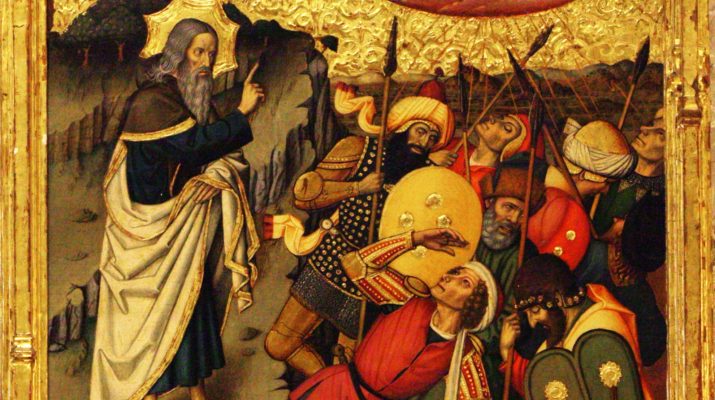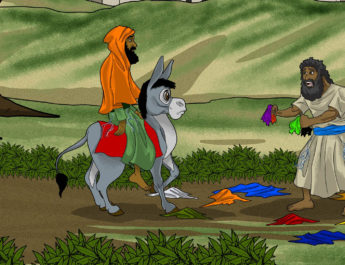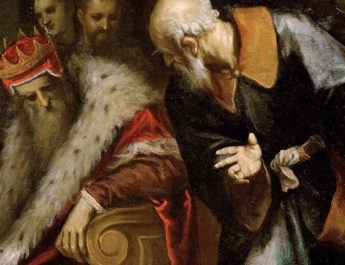Matthew 11:2-11
Advent A3
2 When JohnA heard in prisonB what the MessiahC was doing, he sentD word by his disciplesE 3 and said to him, “Are you the one who is to come, or are we to wait forF another?”
A “John” = ioannes. From Hebrew yochanan (Johanan); from Yehochanan (“the Lord has been gracious”); from YHVH (proper name of the God of Israel); from havah (to become); from hayah (to be, exist, happen) + chanan (beseech, show favor, be gracious; properly, to bend in kindness to someone with less status). This is John.
B “prison” = desmoterion. 4x in NT. From desmos (band, bond, chain, imprisonment, shackle; a string or ligament, infirmity) [from deo (to tie, bind, fasten, impel, compel, knit, tie, wind; declare prohibited and unlawful, prisoner, put in chains; to bind lit or fig)] + –terion (a suffix denoting place). This is prison, prison house, imprisoned, dungeon. Literally, a place of bondage.
C “Messiah” = christos. From chrio (consecrate by anointing with oil; often done for prophets, priests, or kings). Literally, the anointed one, Christ. The Greek word for Messiah.
D “sent” = pempo. To send, transmit, permit to go, put forth. This is to send someone with a focus on their departing rather than their destination. This word is generally used for sending someone on a short errand as opposed to sending them off on an extended mission.
E “disciples” = mathetes. From matheteuo (to make a disciple of); from mathnao (to learn key facts, gain knowledge from experience; generally implies reflection as part of the learning process); from math– (thinking things through). This is a disciple, learner, or student. It is where we get “mathematics” from.
F “wait for” = prosdokao. 16x in NT. From pros (for, at, towards, to with, advantageous for) + dokeuo (to watch). This is to await, expect, wait for, think, anticipate, state of expectation, look. This is to anticipate in thought, to hope or fear.
4 JesusG answered them, “Go and tellH John what you hear and see: 5 the blindI receive their sight,J the lameK walk,L the lepersM are cleansed,N the deafO hear, the dead are raised, and the poorP have good news brought to them.Q 6 And blessedR is anyone who takes no offenseS at me.”
G “Jesus” = iesous. From Hebrew Yehoshua (Joshua, the Lord is salvation); from YHVH (proper name of the God of Israel; the self-existent and eternal one); from havah (to become) or from hayah (to come to pass, become, be) + yasha (to deliver, defend, help, preserve, rescue; properly, to be open, wide or free, which implies being safe. So, in a causative sense, this is to free someone. This is Jesus or Joshua in Greek – the Lord saves or the Lord is salvation.
H “tell” = apaggello. From apo (from, away from) + aggello (to announce, report, bring tidings) [from aggelos (an angel, messenger, delegate; can be an angel from God or a human messenger with news); perhaps from ago (lead, bring, carry, guide)]. This is to report, announce, declare, bring word. It focuses more on the source of that word which gives shape to the news that is proclaimed.
I “blind” = tuphlos. Derivation unclear. Perhaps from tuphoo (to be conceited, foolish, puffed up, haughty; properly, to blow smoke; figuratively being muddled or cloudy in mind; poor judgment that harms spiritual clarity; also, being covered with smoke – so filled with pride); from tuphos (smoke, vanity, arrogance); from tupho (to raise smoke, smolder, slowly consume without flame). This is blind or a blind person – perhaps in the sense of smoke making things opaque and impossible to see. This is blind literally or figuratively.
J “receive…sight” = anablepo. Related to “see” in v4. From ana (upwards, up, again, among, anew) + blepo (to look, see, discern; to be observant or watchful; to look literally or figuratively). This is to look up and so it implies recovering sight.
K “lame” = cholos. 14x in NT. Can be lame, maimed, limping, or someone missing a foot.
L “walk” = peripateo. From peri (about, concerning, around, encompassing) + pateo (to read, trample on; to trample literally or figuratively) [from patos (trodden) OR from paio (to strike, smite, sting; a hit like a single blow)]. This is to walk. Going from Hebrew figurative languish, to walk referred to how you conducted your life, how you chose to live. This word is most literally walking around. Figuratively, it is living, behaving, following, how you occupy yourself. This is where “peripatetic” comes from.
M “lepers” = lepros. 9x in NT. From lepis (a fish scale or flaky substance sloughed off from the body); from lepo (to peel). This is scaly or leprous. Also used of a leper.
N “cleansed” = katharizo. From katharos (clean, clear, pure; clean in a literal, ritual, or spiritual sense; guiltless, innocent, upright; something that has been purged or purified by God). This is to cleanse, make clean, purify, declare clean. To clean in a literal, ritual, or spiritual sense.
O “deaf” = kophos. 14x in NT. Perhaps from kopto (to cut off, strike, beat head or chest as an act of mourning; so, to mourn or grieve). This word is blunt, dull, mute, or deaf. Literally it is blunted so figuratively it is deaf or speechless. Can also refer to a deaf or mute person.
P “poor” = ptochos. From ptosso (to crouch or cower as a beggar does). This is poor or destitute – someone who is extremely power and bowed down because of a long struggle under poverty. Properly, it means bent over so figuratively it is someone who is deeply destitute and lacking tangible resources. This is a beggar – as extremely opposite a wealthy person as possible.
Q “have good news brought to them” = euaggelizo. Related to “tell” in v4. From eu (well, well done, good) + aggelos (see note H above). This is to announce good news, preach goo tidings. This can be used for those hearing the news or for the news itself. Generally refers to the Gospel. This is where the word “evangelism” comes from.
R “blessed” = makarios. From makar (happy); from mak– (become long, large). This is blessed, happy, fortunate, to be envied.
S “takes…offense” = skandalizo. From skandalon (a snare, stumbling block, offense, cause for error; properly, this refers to the thing that triggers a trap – the part of the trap that holds the victim; it is used figuratively for an offence that brings a negative consequence; that which causes one to stumble). This is to put a snare in the way, shock, offend, cause to stumble, sin, or give offense. Figuratively, this is that which impedes good behavior or thought, entices one to sin, trips them up. This is where “scandal” comes from.
7 As they went away, Jesus began to speak to the crowds about John: “What did you go out into the wildernessT to lookU at? A reed shakenV by the wind? 8 What then did you go out to see?W SomeoneX dressedY in soft robes?Z Look,AA those who wearBB soft robes are in royal palaces.CC9 What then did you go out to see? A prophet?DD Yes, I tell you, and more than a prophet.
T “wilderness” = eremos. Properly, a place that is not settled or farmed, not populated. It could be a deserted area or a desert place. It could be seen as secluded, solitary, or lonesome. Any kind of vegetation is sparse, but so are people generally.
U “look” = theaomai. From thaomai (to gaze at a spectacle). This is to behold, look upon, see, view, visit, contemplate. Properly, this is to look at something from the perspective of a spectator, observing closely to try to understand something. This is to gaze at with the goal of being impacted or influence. This is where the word “theatre” comes from.
V “shaken” = saleuo. 15x in NT – 4x of earthquake, 3x heavens shaken, 2x reed shaken by the wind, 1x shaken of mind, 1x of a good measure shaken together, 1x of a house not shaken by the river, 1x I will not be shaken, 1x to incite crowds. From salos (tossing, agitation, rolling; specifically the sea swelling). This is to agitate, shake, stir up, excite, drive away. To waver or topple, so implying to destroy. Figuratively, to disturb or incite.
W “see” = horao. To see, perceive, attend to, look upon, experience. Properly, to stare at and so implying clear discernment. This, by extension, would indicate attending to what was seen and learned. This is to see, often with a metaphorical sense. Can include inward spiritual seeing.
X “someone” = anthropos. From aner (man, male, husband) + ops (eye, face). This is human or humankind. Used for all genders.
Y “dressed” = amphiennumi. 4x in NT – 2x God clothes the grass of the field (Mt 6:30) (Lk 12:28) and 2x when Jesus speaks of John the Baptist (Mt 11:8) (Lk 7:25). From amphoteroi (both, on both sides, around, all) + hennumi (to enrobe, clothe, invest). This is to put on, clothe, be dressed.
Z “soft robes” = malakos. 4x in NT. This is soft, delicate – so, fine clothing. Figuratively used to call one effeminate.
AA “look” = idou. From eido (to be away, see, know, remember, appreciate). This is see! Lo! Behold! Look! Used to express surprise and or draw attention to the statement.
BB “wear” = phoreo. 6x in NT. From phero (to bear, carry, bring forth, conduct, lead; may mean to make known publicly; to carry along particularly for a limit time or on a temporary basis; to bear or carry in a literal or figurative sense). This is to bear constantly, to wear, carry. This is something that is worn or borne on an ongoing basis or continually. It can mean to bear a burden or wearing clothing (since that is worn consistently).
CC “palaces” = oikos. This is the general word for house or household, which includes family or lineage. Can also be used for the nation or the Temple as the house of God. It is house concretely or metaphorically.
DD “prophet” = prophetes. From pro (before, in front of, earlier than) + phemi (to declare, say, use contrasts in speaking to shed light on one point of view). Phemi is from phao (to shine) or phaino (to bring light, cause to appear, shine, become visible or clear). This is a prophet or poet. One who speaks with inspiration from God
10 This is the one about whom it is written,
‘See,EE I am sendingFF my messengerGG ahead of you,HH
who will prepareII your wayJJ before you.’11 TrulyKK I tell you, among those born of womenLL no one has arisen greater than John the Baptist;MM yet the least in the kingdom of heavenNN is greater than he.”
EE “see” = horao. Same as “see” in v8.
FF “sending” = apostello. From apo (from, away from) + stello (to send, set, arrange, prepare, gather up) [probably from histemi (to make to stand, stand, place, set up, establish, appoint, stand firm, be steadfast]. This is to send forth, send away, dismiss, send as a messenger. It implies one that is sent for a particular mission or purpose rather than a quick errand. This is where “apostle” comes from.
GG “messenger” = aggelos. Related to “tell” in v4 and “have good news brought to them” in v5. See note H. This is an angel or messenger – a delegate whether sent from heaven or a human. This is one with news or with specific tasks to accomplish.
HH “ahead of you” = pro + prosopon. Literally “before your face.”
II “prepare” = kataskeuazo. 11x in NT. From kata (down, against, according to) + skeuazo (to prepare precisely with the use of a tool, implement, or vessel; to make ready) [related to skeuos (vessel, implement, article, container, jar, property, goods; can be sea anchor; figuratively a container of wrath or mercy)]. This is to prepare, build, construct, make ready, obtain. To prepare by making ready in an exact manner – with skill through implements according to a design.
JJ “way” = hodos. Way, road, journey, path. It implies progress along the route as well as the path or journey of life in a figurative sense.
KK “truly” = amen. From Hebrew amen (verily, truly, amen, truth, so be it, faithfulness); from aman (to believe, endure, fulfill, confirm, support, be faithful, put one’s trust in, be steadfast. Figuratively, this is to be firm, steadfast, or faithful, trusting, believing, being permanent, morally solid). This word is literally firmness, but figuratively fidelity, faithfulness, honesty, responsibility, trust, truth, steadfastness. Properly, it is to be sure, certain, or firm. This is a word of emphasis indicating that something crucial follows.
LL “women” = gune. Perhaps from ginomai (to come into being, to happen, become, be born; to emerge from one state or condition to another; this is coming into being with the sense of movement or growth). This is woman, wife, or bride.
MM “Baptist” = baptistes. 12x in NT. From baptizo (to dip, submerge, wash; to baptize, immerse); from bapto (to dip, dye, cover with fluid). This is Baptizer or Baptist – name only applied to the son of Zechariah and Elizabeth.
NN “heaven” = ouranos. May be related to oros (mountain, hill) with the notion of height. This is the air, the sky, the atmosphere, and heaven. It is the sky that is visible and the spiritual heaven where God dwells. Heaven implies happiness, power, and eternity.
Image credit: Jaime Huguet, Zaragosa, Spain, c. 1470




